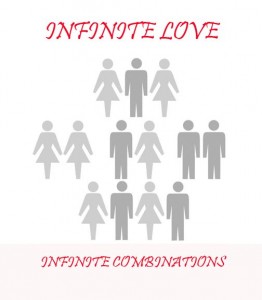 Join us on Facebook at Poly Living!
Join us on Facebook at Poly Living!
Maybe you’re new to polyamory. Maybe you’re someone who is living a polyamorous lifestyle. Or maybe you just heard the term or know someone who is polyamorous. Whatever the reason you’re here, this quick start guide is to offer you help. It is meant as a quick introduction to familiarize your self with polyamory.
What is polyamory? In short, it is “the practice of engaging in multiple sexual relationships with the consent of all the people involved.” (Oxford Dictionary). This means that you are in more than one intimate relationship and everyone involved knows and agrees to this. This is what separates polyamory from cheating. Cheating would occur when a person has another intimate relationship without the knowledge and consent of their partner. If you are a married man and get a girlfriend without your wife’s consent and knowledge, you are cheating. If you and your wife know and agrees to have boyfriends or girlfriends, it is polyamory.
Should you be polyamorous? That’s entirely up to you. But keep in mind that you are not required to poly just as you are not required to be monogamous. You can spend your life happily married or you can choose to be happily single. It is a choice you make. In the same way, polyamory is another option for people a well.
Types of Polyamory
Polyamory is an umbrella term. Think of it this way: you have elementary school, middle school, and high school. All are schools but they are all different types under the umbrella term “school”. In the same way, polyamory is the umbrella term for several types of multiple person relationships. Some people can be part of a “V” or while others have open relationship. You may meet people who are polygamist for religious reasons while others may be swingers. Many types of people are practicing polyamory. While some people have an open relationship, others may have a closed one. There are even people who may have a hybrid open/closed polyamory relationship (swingers who only swing with the same partners is an example). You may want to glance at the Polyamory Combinations article for a fuller look at the different types of poly combinations that are out there. Franklin Veaux created a great image that shows different types of non-monogamous relationships and how they can overlap.
Emotions
The emotion that the average person tends to think when it comes to polyamory is jealousy. This can be understandable if you view a polyamorous relationship like it was a monogamous one. If you think that your partner is only supposed to be with you, then it is easy to see why you would think about jealousy as being the norm for polyamory. Does that mean jealousy does not exist in polyamorous relationships? Of course not! Jealousy exists- it just doesn’t primarily stem from your partner having another partner. Jealousy is a complex emotion that must be examined closely in order to both understand and deal with. You should consider reading our article on Jealousy.
Compersion, “taking joy in the knowledge that your beloveds are expressing their love for one another” (Polyamory Society), is considered the opposite of jealousy. The fact your partner is happy having another lover brings you happiness as well. As with Jealousy, compersion is a complex emotion that you should explore and understand. Our article on Compersion is a good place to start.
Polyamory Groups
Some people are very open about being polyamorous while others stay in the shadows. This could be for many different reasons. For those that want to get together socially with others, there are many groups out there. Such groups can meet both online and in the real world for potlucks, parties and more. Check out the Groups page for online groups on Facebook, Google+ and Yahoo Groups. There are also Meetup groups where you can find a local group in your area to get together with other polyamorous people. Another great resource is Poly Groups. Poly Living offers a chance to talk and connect with others on Facebook and on our Forum.
Glossary
Here are a few important terms from the Glossary.
Closed Relationship- Parties involved in romantic relationship where partners choose not to have other romantic relationships outside of their group.
Compersion- a state of empathetic happiness and joy experienced when an individual’s current or former romantic partner experiences happiness and joy through an outside source, including, but not limited to, another romantic interest.
Metamour- The partner of one’s partner, with whom one does not share a direct sexual or loving relationship.
Open Relationship- Parties involved in romantic relationship where partner(s) can choose to have other romantic relationships in addition to their own
Paramour- Any lover.
Polyamory- the state or practice of having more than one open romantic relationship at a time.
Polycule- Complex inter-connected polyamory relationships involving primaries and secondaries. The relationships may or may not link through different people.
Polyfidelity- all partners are primary to other partners within the group and sex is shared only among the group. More partners can be added with everyone’s consent or it can be closed, choosing not to add any more partners. May choose to make life commitments to each other.
Primary Partner- An anthropological term that describes the partner(s) given priority in time and energy in a relationship. Includes sex and emotional support and may include long term commitments and plans. Most time and energy is spent on this relationship.
Secondary Partner- An anthropological term that describes a partner that is secondary in terms of time and energy in a person’s life in comparison to the primary relationship. Can include emotional support and sex but may or may not include long term commitments or plans. Less time and energy is spent on relationship.
Spice- the plural of spouse; i.e. more than one spouse.
